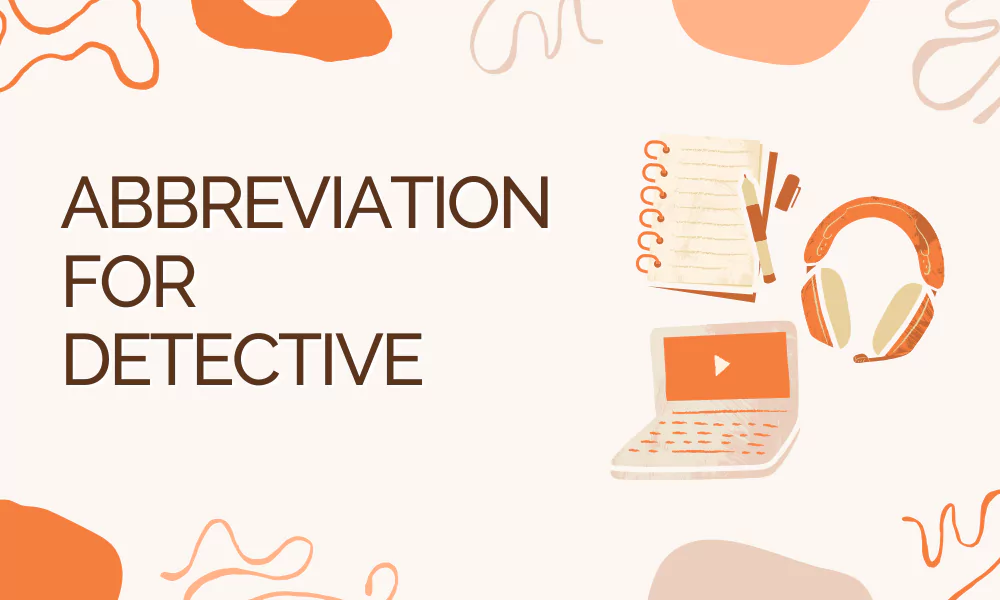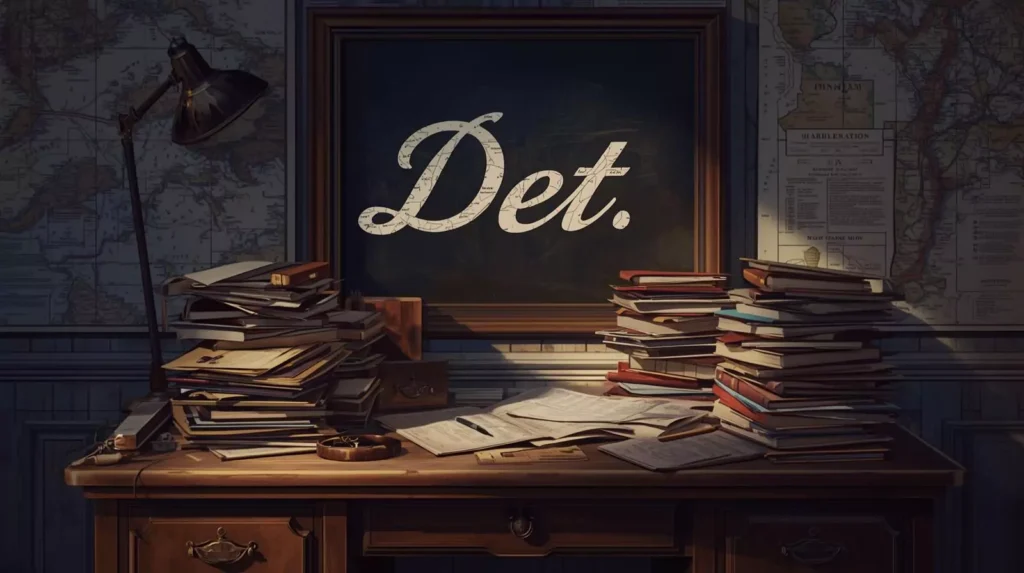Abbreviation for Detective | Common Short Forms, Meanings & Usage

In the world of law enforcement and popular culture, the term detective carries an air of mystery, authority, and intrigue. Just as detectives rely on codes and precision in their work, the title itself is often shortened for practical use. The most common abbreviation is “Det.”, widely seen in police reports, crime novels, and TV dramas. However, variations exist across regions and ranks such as “D/Sgt” for Detective Sergeant in British English or “Detec.” in parts of Latin America. These abbreviations are more than mere shortcuts; they reflect historical usage, cultural differences, and the linguistic evolution of one of society’s most fascinating professions.
What Does Detective Mean?
A detective is a law enforcement professional or investigator whose primary duty is to solve crimes by gathering evidence, questioning witnesses, and uncovering facts. Unlike uniformed officers who often focus on patrol and immediate response, detectives work behind the scenes to analyze cases, connect clues, and bring criminals to justice. The word is also commonly used in fiction, representing characters who embody sharp intellect, observation, and problem-solving skills.

The Role of a Detective
Detectives play a crucial role in maintaining law and order. Their responsibilities include investigating crimes such as theft, fraud, homicide, and organized crime. They examine crime scenes, collect forensic evidence, conduct interviews, and build cases strong enough to stand in court. Beyond real-world policing, the role of a detective has become iconic in literature, film, and television, often portrayed as a figure of mystery and intellect who solves even the most challenging cases.
The History of the Word
The term detective comes from the Latin word detegere, meaning “to uncover” or “to reveal.” It first appeared in English in the mid-19th century, around the time modern police forces were being established. The title was used to describe officers assigned to specialized divisions focused on investigation rather than routine policing. Over time, the word gained cultural weight, popularized by famous fictional detectives like Sherlock Holmes and Hercule Poirot, solidifying its association with intellect, deduction, and mystery.
Common Abbreviations for Detective
| Abbreviation | Usage Context | Example Sentence |
|---|---|---|
| Det. | Standard, official, most common | Det. Harris questioned the suspect. |
| Dt. | Rare, used in some departments | Dt. Brown filed the report. |
| (Full Word) | General, casual, or formal writing | The detective solved the case quickly. |
Pronunciation Guide for Detective and Its Abbreviations
The word detective is pronounced /dɪ-ˈtɛk-tɪv/, with the stress on the second syllable. In everyday speech, some speakers may drop the middle c sound, making it sound like de-tec-tiv. The abbreviation “Det.” is simply read as Detective when spoken, while abbreviations like D/Sgt (Detective Sergeant) are read in full as their expanded form, not spelled out letter by letter.
Synonyms and Alternative Words for Detective
Depending on context, several synonyms can replace “detective”:- Investigator
- Private Eye
- Sleuth
- Inspector (commonly used in the U.K.)
- Gumshoe (colloquial, old-fashioned)
Proper Use of the Abbreviation
In Law Enforcement and Official Writing
In formal and professional contexts, abbreviations like “Det.” are widely used to indicate rank or title, e.g., Det. Johnson. In British English and other Commonwealth countries, abbreviations such as D/Inspector or D/Sgt are common in official documents and reports. These shortenings help maintain clarity and efficiency while preserving the officer’s title.
In Literature, Media, and Informal Use
In books, movies, and television, abbreviations like “Det.” often appear in character names, script directions, or captions. However, in informal writing, people may use variations like Detec. or simply D to keep the tone casual. In popular culture, fans sometimes even use playful terms like PI or sleuth instead of the formal abbreviation..
Example Sentences
With the Full Word “Detective”
- The detective carefully examined the crime scene for hidden clues.
- She dreamed of becoming a detective after reading mystery novels as a child.
- The detective interviewed all the witnesses before filing his report.

With the Abbreviation “Det.”
- Det. Harris led the investigation into the burglary.
- According to the police report, Det. Lopez questioned the suspects.
- Det. Smith was promoted after solving a series of high-profile cases.
Related Abbreviations in Law Enforcement
- Sgt. (Sergeant) – A supervisory rank in police forces, Sgt. is short for Sergeant. Example: Sgt. Brown coordinated the patrol units during the operation.
- Insp. (Inspector) – Insp. stands for Inspector, a senior rank often tasked with overseeing complex investigations. Example: Insp. Clarke reviewed the case files prepared by the detectives.
- Capt. (Captain) – Capt. is the abbreviation for Captain, a higher-ranking officer who supervises multiple units or divisions. Example: Capt. Morgan held a press conference to address the community about the case.
Read: Metaphors for Winter
FAQs
Conclusion
The abbreviation for detective may seem simple, but it carries both professional significance and cultural weight. From the widely recognized “Det.” in American English to “D/Sgt” and other variations in British law enforcement, these shortenings reflect history, practicality, and regional usage. Detectives are not only vital figures in real-world policing but also timeless characters in literature and media, where their titles and abbreviations help define their role. Whether you encounter the term in a police report, a crime novel, or a TV script, understanding these abbreviations adds clarity and appreciation for one of the most intriguing professions in society.
